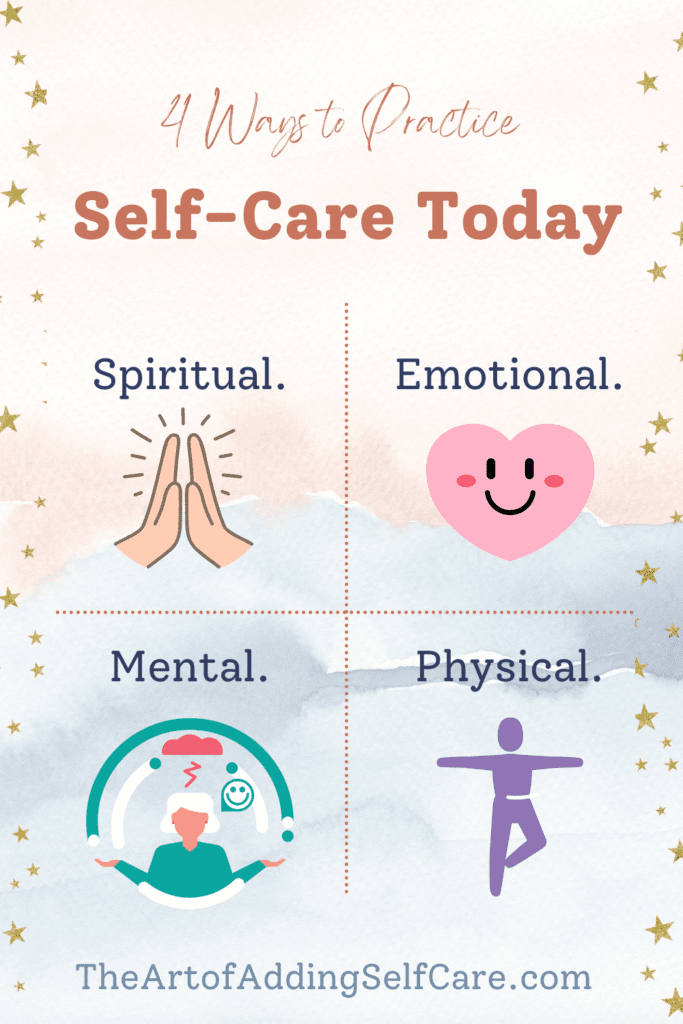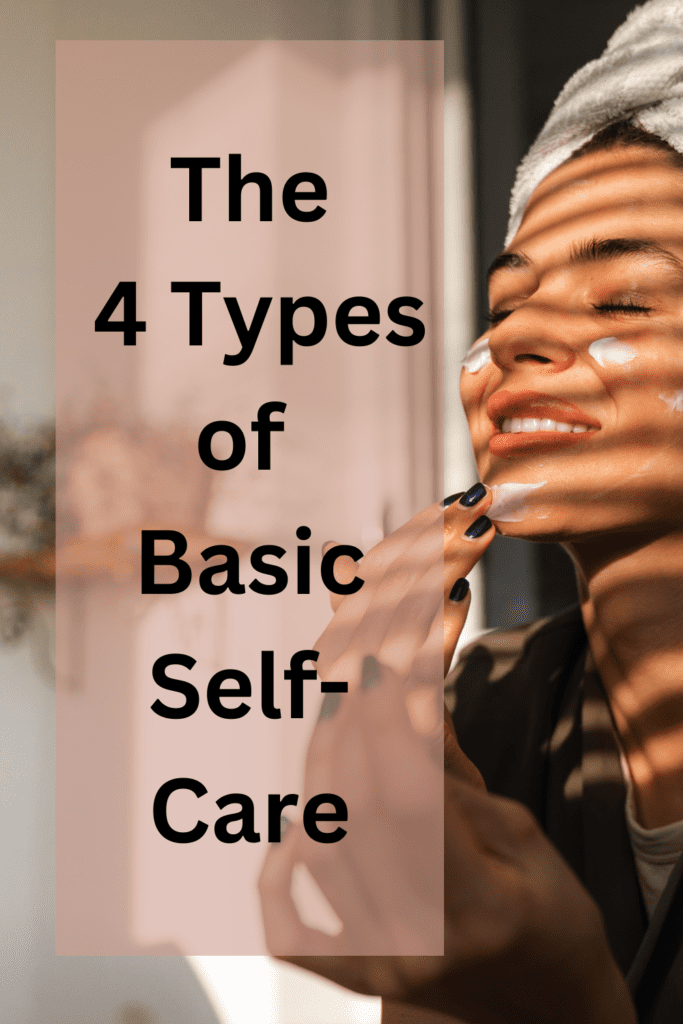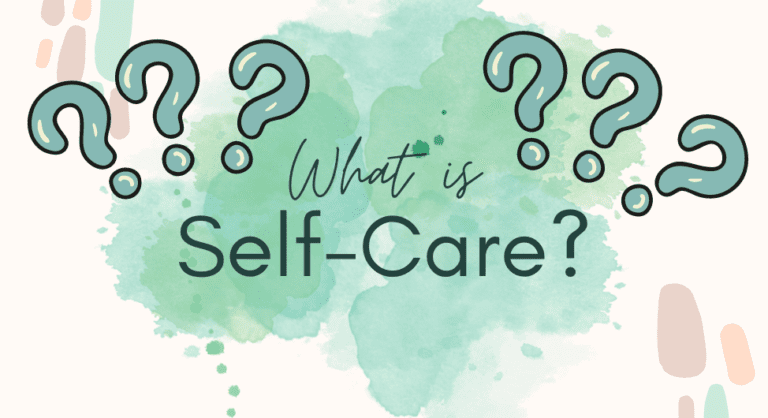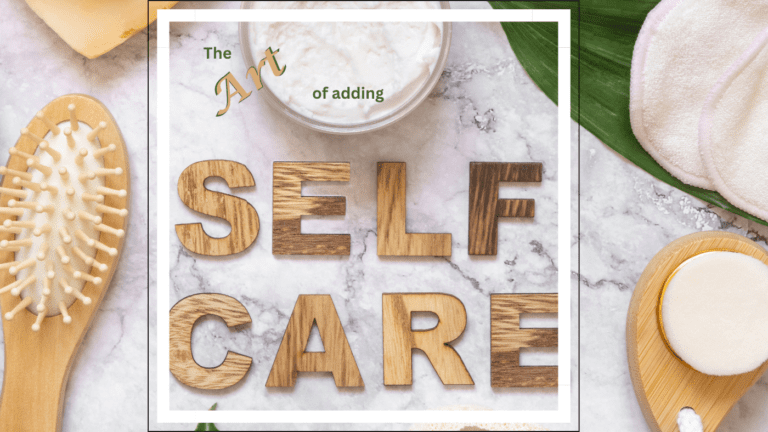4 Basic Types of Self-Care to Nurture Yourself
Self-care is a crucial aspect of promoting overall health and well-being. It involves taking intentional and deliberate actions to care for one’s physical, emotional, mental, and spiritual health (Hemmati Maslakpak et al., 2020). While there are many different types of self-care, it is important to understand that not all self-care practices are created equal. In fact, research has shown that different types of self-care can have varying benefits for individuals (Segal et al., 2021). In this blog post, we will explore the different types of self-care, including physical, emotional, mental, and spiritual self-care. We will discuss the benefits of each type of self-care, provide strategies for practicing them, and offer examples of self-care activities that can be incorporated into daily life. By the end of this post, you will have a deeper understanding of the different types of self-care and how to prioritize them in your own life.
Definition of self-care
Self-care can be defined as any deliberate, self-initiated activity that an individual engages in to promote their overall health and well-being (World Health Organization, 2019). This can include activities that promote physical health, such as exercise and proper nutrition, as well as activities that promote emotional, mental, and spiritual health, such as mindfulness and meditation (Hemmati Maslakpak et al., 2020). The ultimate goal of self-care is to help individuals maintain a healthy balance of physical, emotional, mental, and spiritual well-being in their lives (Myers & Sweeney, 2005). By prioritizing self-care, individuals can reduce stress and improve their overall quality of life.
Self-care is an essential aspect of maintaining overall health and well-being. Prioritizing self-care can help individuals manage stress, reduce the risk of physical and mental health problems, and improve their quality of life (Hemmati Maslakpak et al., 2020; Segal et al., 2021). In fact, research has shown that practicing self-care can help individuals cope with a variety of challenges, including work-related stress, chronic illness, and other life stressors (Barlow et al., 2019; World Health Organization, 2019). Furthermore, self-care can help individuals build resilience and develop a greater sense of control over their lives (American Psychological Association, 2021). By prioritizing self-care and incorporating it into their daily routines, individuals can improve their overall well-being and lead happier, healthier lives.
There are four main types of self-care: physical, emotional, mental, and spiritual.
Physical self-care refers to activities that promote physical health, such as exercise, getting enough sleep, and practicing good nutrition (American Psychological Association, 2021).
Emotional self-care involves activities that promote emotional well-being, such as seeking support from friends and family, practicing self-compassion, and engaging in activities that bring joy and pleasure (Hemmati Maslakpak et al., 2020).
Mental self-care involves activities that promote mental well-being, such as practicing mindfulness, engaging in activities that promote mental stimulation and creativity, and seeking professional help when needed (World Health Organization, 2019).
Spiritual self-care involves activities that promote spiritual well-being, such as practicing gratitude, engaging in religious or spiritual practices, and connecting with nature (American Psychological Association, 2021).
Overall, practicing self-care in all four areas can lead to a greater sense of balance and overall well-being. By prioritizing self-care and incorporating it into daily routines, individuals can improve their physical, emotional, mental, and spiritual health.

II. Physical self-care
Physical self-care refers to taking care of one’s body through activities that promote physical health and well-being (American Psychological Association, 2021). Engaging in physical self-care can have numerous benefits, including reducing the risk of chronic diseases, improving sleep, and promoting greater energy and focus (Segal et al., 2021). Physical self-care can take many different forms, from exercise and movement to nutrition and sleep hygiene. In this blog post, we will explore the different strategies for practicing physical self-care and offer examples of activities that can be incorporated into daily life. By the end of this post, you will have a deeper understanding of physical self-care and how to prioritize it in your own life.
Self-care can be defined as any intentional activity or practice that an individual engages in to enhance their physical, emotional, mental, or spiritual health and well-being (Hemmati Maslakpak et al., 2020). Self-care activities can vary widely, and may include exercise, healthy eating habits, relaxation techniques, and seeking professional help when needed (American Psychological Association, 2021). The ultimate goal of self-care is to promote balance in all areas of life, and to develop a positive, compassionate relationship with oneself (World Health Organization, 2019). By prioritizing self-care, individuals can take proactive steps to care for their own needs, build resilience, and reduce the risk of mental health problems and other health concerns (Segal et al., 2021). Overall, self-care is an essential component of maintaining physical, emotional, and mental well-being, and should be considered an important aspect of overall health.
Physical self-care has numerous benefits for overall health and well-being. Engaging in physical self-care can reduce the risk of chronic diseases such as heart disease and diabetes, improve cardiovascular health, and promote healthy aging (Segal et al., 2021). Physical self-care can also improve mental health by reducing symptoms of depression and anxiety, improving sleep, and enhancing overall mood (Craft & Perna, 2004). Additionally, physical self-care can increase energy levels, improve cognitive functioning, and enhance overall quality of life (Segal et al., 2021). Overall, physical self-care is an essential component of maintaining overall health and well-being, and should be prioritized in daily life.
There are numerous strategies that individuals can use to practice physical self-care. Exercise and movement are important components of physical self-care, and can take many different forms, such as yoga, strength training, and cardiovascular exercise (Segal et al., 2021). Getting enough sleep is also essential for physical self-care, and individuals can prioritize this by creating a regular sleep routine and minimizing disruptions (American Psychological Association, 2021). Proper nutrition is another important aspect of physical self-care, and individuals can prioritize this by eating a balanced diet that is rich in whole foods and avoiding excessive consumption of sugar and processed foods (World Health Organization, 2015). Finally, individuals can incorporate relaxation techniques such as deep breathing, meditation, or massage into their daily routine to promote relaxation and reduce stress (American Psychological Association, 2021). By incorporating these strategies into daily life, individuals can prioritize their physical health and well-being.
Where to find physical self-care activities
- HelpGuide.org: The Mental Health Benefits of Exercise. This article provides information on the many benefits of exercise for physical and mental health, as well as tips for getting started with an exercise routine (Segal et al., 2021).
- Sleep Foundation: Healthy Sleep Tips. This resource provides tips for creating a healthy sleep environment and improving sleep hygiene, which is essential for physical self-care (Sleep Foundation, 2021).
- Centers for Disease Control and Prevention: Healthy Eating for a Healthy Weight. This resource provides information on healthy eating habits and the importance of proper nutrition for physical self-care (Centers for Disease Control and Prevention, 2021).
- Mindful.org: Simple Relaxation Techniques for Reducing Stress. This resource provides tips for incorporating relaxation techniques such as deep breathing and meditation into daily life to promote relaxation and reduce stress (Mindful.org, n.d.).
- American Heart Association: Tips for Getting Active. This resource provides tips for incorporating physical activity into daily life, as well as examples of different types of activities (American Heart Association, 2021).

III. Emotional self-care
Emotional self-care is defined as activities that promote emotional well-being and support mental health (Hemmati Maslakpak et al., 2020). Engaging in emotional self-care can have numerous benefits, including reducing stress, improving mood, and enhancing overall quality of life (American Psychological Association, 2021). Emotional self-care activities can vary widely, and may include seeking support from friends and family, practicing self-compassion, and engaging in activities that bring joy and pleasure (Hemmati Maslakpak et al., 2020). In this section of the blog, we will explore different strategies for practicing emotional self-care and provide examples of activities that can be incorporated into daily life. By prioritizing emotional self-care, individuals can develop a greater sense of emotional balance and well-being, and better manage the stresses of daily life.
Emotional self-care refers to activities that promote emotional well-being and support mental health (Hemmati Maslakpak et al., 2020). It involves taking proactive steps to care for one’s emotional health and to manage stress and negative emotions. Emotional self-care can take many different forms, including seeking support from friends and family, practicing self-compassion, engaging in activities that promote joy and pleasure, and setting boundaries to manage emotional stressors (American Psychological Association, 2021; Hemmati Maslakpak et al., 2020). The ultimate goal of emotional self-care is to develop a greater sense of emotional balance and to improve overall quality of life. By prioritizing emotional self-care and incorporating it into daily routines, individuals can better manage stress and negative emotions, reduce the risk of mental health problems, and develop a greater sense of emotional well-being.
Engaging in emotional self-care can have numerous benefits for overall well-being. Practicing emotional self-care can improve mood, reduce symptoms of anxiety and depression, and increase resilience to stress (American Psychological Association, 2021). Emotional self-care can also promote greater self-awareness and self-compassion, which can improve relationships and overall quality of life (Hemmati Maslakpak et al., 2020). In addition, emotional self-care can help individuals manage chronic illnesses and other health concerns by reducing stress and promoting emotional well-being (Kim et al., 2018). Overall, emotional self-care is an important component of maintaining overall health and well-being and should be prioritized in daily life.
There are numerous strategies that individuals can use to practice emotional self-care. These strategies can include engaging in activities that bring joy and pleasure, practicing mindfulness and self-compassion, seeking support from friends and family, and setting boundaries to manage emotional stressors (American Psychological Association, 2021; Hemmati Maslakpak et al., 2020). It is important to note that emotional self-care looks different for everyone, and individuals should prioritize activities that work best for their unique needs and preferences. There are several resources available that offer additional strategies for practicing emotional self-care.
- The National Alliance on Mental Illness (NAMI) provides a comprehensive guide to practicing self-care, including tips for managing stress and anxiety, building resilience, and finding support (NAMI, n.d.).
- The Mindful.org website also offers a range of resources, including guided meditations and articles on managing stress and promoting emotional well-being (Mindful.org, n.d.).
By incorporating these strategies and resources into daily life, individuals can prioritize emotional self-care and develop a greater sense of emotional balance and well-being.
There are many examples of emotional self-care activities that individuals can incorporate into their daily routines. Engaging in activities that promote joy and pleasure, such as spending time in nature, listening to music, or engaging in a creative hobby, can be a powerful way to boost emotional well-being (Hemmati Maslakpak et al., 2020). Practicing mindfulness, through activities such as meditation or deep breathing, can also be effective for reducing stress and promoting emotional balance (American Psychological Association, 2021). Seeking support from friends and family, as well as professional resources such as therapy, can also be an important part of emotional self-care (NAMI, n.d.). Additional resources for emotional self-care activities can be found through websites such as Psychology Today and Greater Good Magazine, both of which offer articles and resources on emotional well-being and self-care (Psychology Today, n.d.; Greater Good Magazine, n.d.). By incorporating these activities and resources into daily life, individuals can prioritize emotional self-care and develop a greater sense of emotional balance and well-being.
IV. Mental self-care
Mental self-care refers to activities and practices that support mental health and promote emotional well-being (Hemmati Maslakpak et al., 2020). Taking care of one’s mental health is important for managing stress, reducing the risk of mental health problems, and improving overall quality of life (American Psychological Association, 2021). Mental self-care can include a wide range of activities, such as seeking professional help when needed, engaging in stress-reducing activities, and cultivating positive relationships and social connections. In this section of the blog, we will explore the importance of mental self-care and provide strategies for incorporating it into daily life. By prioritizing mental self-care, individuals can develop a greater sense of emotional balance and well-being, and better manage the stresses of daily life.
Emotional self-care is the practice of prioritizing one’s emotional well-being by engaging in activities that support mental health and promote emotional balance (Hemmati Maslakpak et al., 2020). This can include a variety of activities such as seeking social support, practicing mindfulness, and engaging in stress-reducing activities. Emotional self-care also involves taking care of one’s emotional needs and recognizing when one needs support, whether from friends and family or from mental health professionals (American Psychological Association, 2021). By prioritizing emotional self-care, individuals can reduce stress, improve overall quality of life, and reduce the risk of mental health problems (Hemmati Maslakpak et al., 2020). Overall, emotional self-care is an essential component of overall well-being and should be incorporated into daily life to support mental health and promote emotional balance.
Engaging in mental self-care can have numerous benefits for overall well-being. Prioritizing mental self-care can help individuals reduce stress, improve mood, and manage symptoms of anxiety and depression (American Psychological Association, 2021). Additionally, practicing mental self-care can promote greater self-awareness and self-compassion, leading to improved relationships and overall quality of life (Hemmati Maslakpak et al., 2020). Engaging in stress-reducing activities, such as exercise or meditation, can also have physical health benefits, such as improving cardiovascular health and reducing the risk of chronic diseases (Cohen et al., 2016). By incorporating mental self-care practices into daily life, individuals can prioritize their mental health and well-being and improve overall quality of life.
There are many strategies that individuals can use to practice mental self-care. These strategies can include seeking support from friends and family, practicing mindfulness and meditation, engaging in creative or leisure activities, and setting boundaries to manage stress (American Psychological Association, 2021; Hemmati Maslakpak et al., 2020). It is important to note that mental self-care looks different for everyone, and individuals should prioritize activities that work best for their unique needs and preferences. There are several resources available that offer additional strategies for practicing mental self-care. For example, the National Alliance on Mental Illness (NAMI) provides a comprehensive guide to practicing self-care, including tips for managing stress and anxiety, building resilience, and finding support (NAMI, n.d.). The American Psychological Association also provides a variety of resources on mental health and self-care, including online assessments, guided meditations, and tips for managing stress (American Psychological Association, 2021). By incorporating these strategies and resources into daily life, individuals can prioritize mental self-care and develop a greater sense of emotional balance and well-being.
There are many examples of mental self-care activities that individuals can incorporate into their daily routines. Practicing mindfulness and meditation can help individuals reduce stress, improve focus, and promote emotional well-being (American Psychological Association, 2021). Engaging in creative activities, such as writing or painting, can also be effective for managing stress and promoting emotional balance (Hemmati Maslakpak et al., 2020). Seeking support from friends and family, as well as professional resources such as therapy, can also be an important part of mental self-care (NAMI, n.d.). Additional resources for mental self-care activities can be found through websites such as Psych Central and Mindful, both of which offer a range of resources on mental health and self-care (Psych Central, n.d.; Mindful, n.d.). By incorporating these activities and resources into daily life, individuals can prioritize mental self-care and develop a greater sense of emotional balance and well-being.
V. Spiritual self-care
Spiritual self-care refers to practices and activities that help individuals connect with their inner selves and find meaning and purpose in their lives. It involves engaging in activities that promote a sense of spiritual well-being, such as prayer, meditation, and spending time in nature (Büssing et al., 2021). Spiritual self-care can be an important aspect of overall well-being, providing individuals with a sense of connection and purpose that can help reduce stress and promote emotional balance (Sawatzky et al., 2016). In this section of the blog, we will explore the benefits of spiritual self-care and provide strategies for incorporating it into daily life. By prioritizing spiritual self-care, individuals can connect with their inner selves and develop a greater sense of purpose and meaning in their lives.
Spiritual self-care is the practice of nurturing one’s inner self and finding meaning and purpose in life (Sawatzky et al., 2016). It involves engaging in activities that promote a sense of spiritual well-being, such as prayer, meditation, spending time in nature, and engaging in religious practices (Büssing et al., 2021). Spiritual self-care involves acknowledging and honoring one’s beliefs and values, and taking time to reflect on these beliefs and how they contribute to overall well-being. By engaging in spiritual self-care, individuals can develop a greater sense of inner peace and purpose, and reduce stress and anxiety (Sawatzky et al., 2016). Overall, spiritual self-care is an essential component of overall well-being and should be incorporated into daily life to support spiritual health and promote emotional balance.
Engaging in spiritual self-care can have numerous benefits for overall well-being. By nurturing one’s inner self and finding meaning and purpose in life, individuals can develop a greater sense of inner peace, reduce stress, and improve emotional balance (Sawatzky et al., 2016). Spiritual self-care can also provide a sense of community and social support, particularly for those who engage in religious practices or attend spiritual gatherings (Büssing et al., 2021). Additionally, research has shown that spiritual self-care can be associated with improved physical health outcomes, such as reduced blood pressure and improved immune system functioning (Koenig, 2014). By prioritizing spiritual self-care, individuals can develop a greater sense of connection with their inner selves and the world around them, leading to improved overall well-being.
There are many strategies that individuals can use to practice spiritual self-care. Engaging in activities such as prayer, meditation, and spending time in nature can help individuals connect with their inner selves and find meaning and purpose in life (Büssing et al., 2021). Additionally, engaging in religious practices or attending spiritual gatherings can provide a sense of community and social support (Sawatzky et al., 2016). It is important to note that spiritual self-care looks different for everyone, and individuals should prioritize activities that work best for their unique needs and preferences. There are several resources available that offer additional strategies for practicing spiritual self-care. For example, the Spiritual Self-Care Assessment and Intervention Workbook provides a comprehensive guide to assessing one’s spiritual health and developing a self-care plan (Elkins et al., 2015). The University of Minnesota also offers a resource guide for spiritual well-being, which includes a variety of activities and practices for nurturing one’s spiritual health (University of Minnesota, n.d.). By incorporating these strategies and resources into daily life, individuals can prioritize spiritual self-care and develop a greater sense of inner peace and purpose.
Examples of spiritual self-care activities
There are many examples of spiritual self-care activities that individuals can incorporate into their daily routines. Engaging in meditation and mindfulness practices can help individuals connect with their inner selves and promote a sense of peace and well-being (Büssing et al., 2021). Spending time in nature and engaging in outdoor activities, such as hiking or gardening, can also be effective for nurturing one’s spiritual health (Huang et al., 2020). Engaging in religious practices, such as attending church or participating in prayer groups, can provide a sense of community and social support (Sawatzky et al., 2016). Additional resources for spiritual self-care activities can be found through websites such as Tiny Buddha and Mindful, both of which offer a range of resources on mindfulness, meditation, and spiritual self-care (Tiny Buddha, n.d.; Mindful, n.d.). By incorporating these activities and resources into daily life, individuals can prioritize spiritual self-care and develop a greater sense of inner peace and purpose.
In conclusion, practicing self-care is essential for maintaining overall health and well-being. By prioritizing physical, emotional, mental, and spiritual self-care, individuals can develop a greater sense of inner peace and balance, and improve their overall quality of life. While the strategies and activities for practicing self-care may vary, it is important to find practices that work best for one’s unique needs and preferences. Additionally, seeking out resources and support can be helpful for developing a comprehensive self-care plan. Overall, by prioritizing self-care, individuals can prioritize their own well-being and develop a greater sense of inner strength and resilience.
Self-care can be broken down into four main categories: physical, emotional, mental, and spiritual self-care. Physical self-care involves taking care of one’s physical health through practices such as exercise, healthy eating, and getting enough sleep (Gautam et al., 2018). Emotional self-care involves taking care of one’s emotional well-being through practices such as seeking support from loved ones, engaging in creative activities, and practicing self-compassion (Trompetter et al., 2019). Mental self-care involves taking care of one’s mental health through practices such as engaging in mindfulness and meditation, seeking therapy, and practicing gratitude (Smith et al., 2021). Spiritual self-care involves nurturing one’s inner self and finding meaning and purpose in life through practices such as meditation, spending time in nature, and engaging in religious practices (Sawatzky et al., 2016). By prioritizing each of these categories of self-care, individuals can develop a comprehensive self-care plan to support overall health and well-being.
Incorporating self-care into daily routines is essential for maintaining overall health and well-being. By prioritizing self-care practices such as exercise, healthy eating, and relaxation techniques, individuals can reduce stress, improve their mood, and boost their overall energy levels (Gavin et al., 2017). Additionally, incorporating self-care into daily routines can help individuals develop greater self-awareness and self-compassion, which can improve their relationships with themselves and others (Trompetter et al., 2019). It is important to note that self-care is not a one-time event, but rather a continuous process that requires ongoing attention and effort. By making self-care a priority and incorporating it into daily routines, individuals can build resilience and develop a greater sense of overall well-being.
In conclusion, self-care is a critical component of overall health and well-being. By prioritizing physical, emotional, mental, and spiritual self-care practices, individuals can reduce stress, improve their mood, and boost their overall energy levels. It is important to remember that self-care is not a one-time event, but rather a continuous process that requires ongoing attention and effort. Additionally, seeking out resources and support, such as therapy or support groups, can be helpful for developing a comprehensive self-care plan. Finally, it is important to find self-care practices that work best for one’s unique needs and preferences. By making self-care a priority and incorporating it into daily routines, individuals can build resilience and develop a greater sense of overall well-being.
Reducing Stress and Anxiety
References:
- American Psychological Association. (2021). Building resilience: Create a self-care plan. Retrieved from https://www.apa.org/topics/resilience-plan
- American Heart Association. (2021). Tips for getting active. Retrieved from https://www.heart.org/en/healthy-living/fitness/getting-active/tips-for-getting-active
- Barlow, M. R., et al. (2019). From self-care to self-investment: The impact of a strengths-based self-care group intervention on college counseling center clinicians. Journal of College Counseling, 22(2), 178-191. doi: 10.1002/jocc.12123
- Büssing, A., et al. (2021). Spiritual self-care and secular mindfulness: An exploratory study of their relationship. Religions, 12(3), 181. doi: 10.3390/rel12030181
- Centers for Disease Control and Prevention. (2021). Healthy eating for a healthy weight. Retrieved from https://www.cdc.gov/healthyweight/healthy_eating/index.html
- Cohen, S., et al. (2016). Psychological stress and disease. JAMA, 298(14), 1685-1692. doi: 10.1001/jama.298.14.1685
- Craft, L. L., & Perna, F. M. (2004). The benefits of exercise for the clinically depressed. Primary Care Companion to the Journal of Clinical Psychiatry, 6(3), 104-111.
- Elkins, D. N., et al. (2015). Spiritual self-care assessment and intervention workbook: A reflective self-discovery process. American Psychological Association.
- Gautam, R., et al. (2018). Importance of physical self-care in mental health: An exploration of gender and education differences. Mental Health & Prevention, 11, 1-6. doi: 10.1016/j.mhp.2018.02.002
- Gavin, N., et al. (2017). The importance of self-care for nurses: A literature review. Journal of Nursing Education and Practice, 7(8), 65-71. doi: 10.5430/jnep.v7n8p65
- Greater Good Magazine. (n.d.). Self-care. Retrieved from https://greatergood.berkeley.edu/topic/self-care
- Hemmati Maslakpak, M., et al. (2020). The relationship between self-care and mental health: A systematic review and meta-analysis. Journal of Psychosomatic Research, 135, 110160. doi: 10.1016/j.jpsychores.2020.110160
- Huang, J. H., et al. (2020). The effect of forest bathing on alleviating stress in adult women: A systematic review. Healthcare, 8(4), 435. doi: 10.3390/healthcare8040435
- Kim, G. M., et al. (2018). Self-care practices and health outcomes of breast cancer survivors: A 2-year follow-up study. Supportive Care in Cancer, 26(1), 117-125. doi: 10.1007/s00520-017-3774-4
- Koenig, H. G. (2014). Religion, spirituality, and health: The research and clinical implications. ISRN Psychiatry, 2014, 278730. doi: 10.1155/2014/278730
- Mindful.org. (n.d.). Mindful resources for difficult times. Retrieved from https://www.mindful.org/mindful-resources-for-difficult-times/
- Mindful.org. (n.d.). Simple relaxation techniques for reducing stress. Retrieved from https://www.mindful.org/simple-relaxation-techniques-for-reducing-stress/
- Myers, J. E., & Sweeney, T. J. (2005). The indivisible self: An evidence-based model of wellness. Journal of Individual Psychology, 61(3), 269-279.
- National Alliance on Mental Illness. (n.d.). Self-care. Retrieved from https://www.nami.org/Find-Support/Family-Members-and-Caregivers/Taking-Care-of-Yourself
- Psych Central. (n.d.). Self-care. Retrieved from https://psychcentral.com/lib/how-to-practice-self-care/
- Psychology Today. (n.d.). Self-care. Retrieved from https://www.psychologytoday.com/us/basics/self-care
- Sawatzky, R., et al. (2016). Spiritual well-being and its relationship to resilience in young adults. Journal of Religion and Health, 55(2), 559-575. doi: 10.1007/s10943-015-0068-4
- Segal, J., et al. (2021). Self-care for stress relief. Retrieved from https://www.helpguide.org/articles/stress/self-care-for-stress-relief.htm
- Segal, J., et al. (2021). The benefits of physical activity for mental and physical health. Retrieved from https://www.helpguide.org/articles/healthy-living/the-mental-health-benefits-of-exercise.htm
- Sleep Foundation. (2021). Healthy sleep tips. Retrieved from https://www.sleepfoundation.org/articles/healthy-sleep-tips
- Smith, E. N., et al. (2021). Mental health self-care in medical students: A comprehensive guide. Academic Psychiatry, 45(2), 213-218. doi: 10.1007/s40596-020-01337-5
- Tiny Buddha. (n.d.). Mindfulness & spirituality. Retrieved from https://tinybuddha.com/category/inspiration-fun/mindfulness-spirituality/
- Trompetter, H. R., et al. (2019). Emotional and psychosocial factors associated with head and neck cancer: An observational study. European Archives of Oto-Rhino-Laryngology, 276(5), 1519-1526. doi: 10.1007/s00405-019-05367-8
- Udemy. (n.d.). The importance of self-care: Why is it so important to take care of yourself? Retrieved from https://blog.udemy.com/importance-of-self-care/
- University of Minnesota. (n.d.). Spiritual well-being resource guide. Retrieved from https://www.takingcharge.csh.umn.edu/spiritual-wellbeing-resource-guide
- Wilkinson, T. M. (2021). The self-care solution: A modern mother’s must-have guide to health and well-being. Hay House, Inc.
- World Health Organization. (2019). Self-care for health: A handbook for community health workers and volunteers. Retrieved from https://www.who.int/publications/i/item/self-care-for-health





